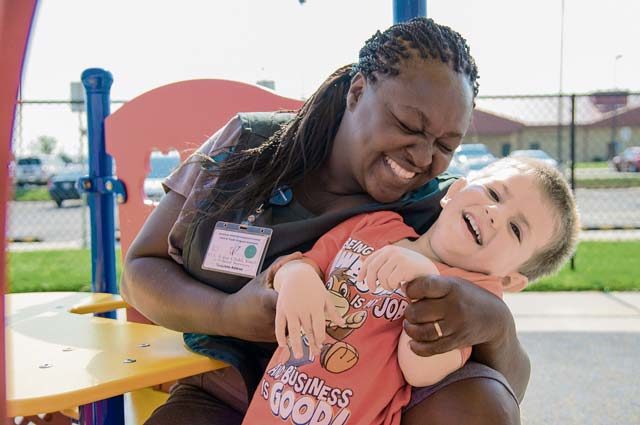
Child development centers play an important role in helping military families through daily life. These on-post child care centers give military parents the option of full-day, part-day and hourly care for their children. The caregivers at the centers are committed to providing children with developmental experiences in nationally accredited environments, going above and beyond the role of a simple babysitter.
Jessica Ruiz, supervisory program specialist at the Landstuhl CDC, wants the public to know just how hard the employees of the CDC work to help their students progress.
CDC caregivers are responsible for the children’s education, safety, health and development to the next age group in the center: infant to toddler, toddler to preschool and preschool to kindergarten. Ruiz said their days resemble those of school teachers more than babysitters or daycare workers. Aside from establishing daily routines, CDC caregivers also create lesson plans, meet learning objectives and grow and develop important skills.
“Our caregivers are trained to deal with each child as an individual and meet his or her needs by individualized instruction,” Ruiz said.
These trained early childhood professionals work with a wide range of children in their care — different backgrounds and cultures, different developmental needs, special needs children and children who are dealing with parent deployments, just to name a few. Along with many having educational backgrounds in related fields, caregivers receive monthly early childhood training and have CPR and First Aid certifications.
“Our caregivers know and understand the children on a personal level. They learn what each child’s strength and weaknesses are in their classroom and are able to form lesson plans around the needs of the children in their care. Some children are in our center from six weeks old all the way though kindergarten.”
The responsibilities of the CDC caregivers don’t end when the daily lesson does. Ruiz explained that they also do observations and assessments on all the children in their classroom, wash toys, change diapers, do laundry, clean the shelves, and make sure shelves are labeled and have the proper toys for each section of the classroom. Many of these roles are unseen by parents who drop their children off day after day, she said.
Along with an understanding of the challenging daily lives of CDC caregivers, Ruiz also wants the Kaiserslautern Military Community to be aware of the important role that the CDC plays in helping military service members accomplish their missions.
As a prior “military brat” herself, Ruiz said she knows firsthand how crucial their services are.
“I love knowing we provide not only a safe and healthy place for the children to come to, but a place where all children are loved and accepted for who they are,” she said. “The CDC is a second home to many of these children and they look up to our teachers as role models. When a parent comes to one of our CDCs they become part of a family who will help them through any tough situation they come across. Most of all, they can go to work knowing their child is loved and well taken care of by professionally trained teachers.”
May 7 to 11 is Teacher Appreciation Week and Ruiz said CDC caregivers shouldn’t be forgotten during this time. For those looking to show their appreciation, Ruiz explained that while candy and flowers are nice gestures, what your children’s caregivers really need is a little bit of help. Volunteering in your child’s class is a great way to show that you care. If schedules don’t allow for that, remember that a simple thank you goes a long way.


